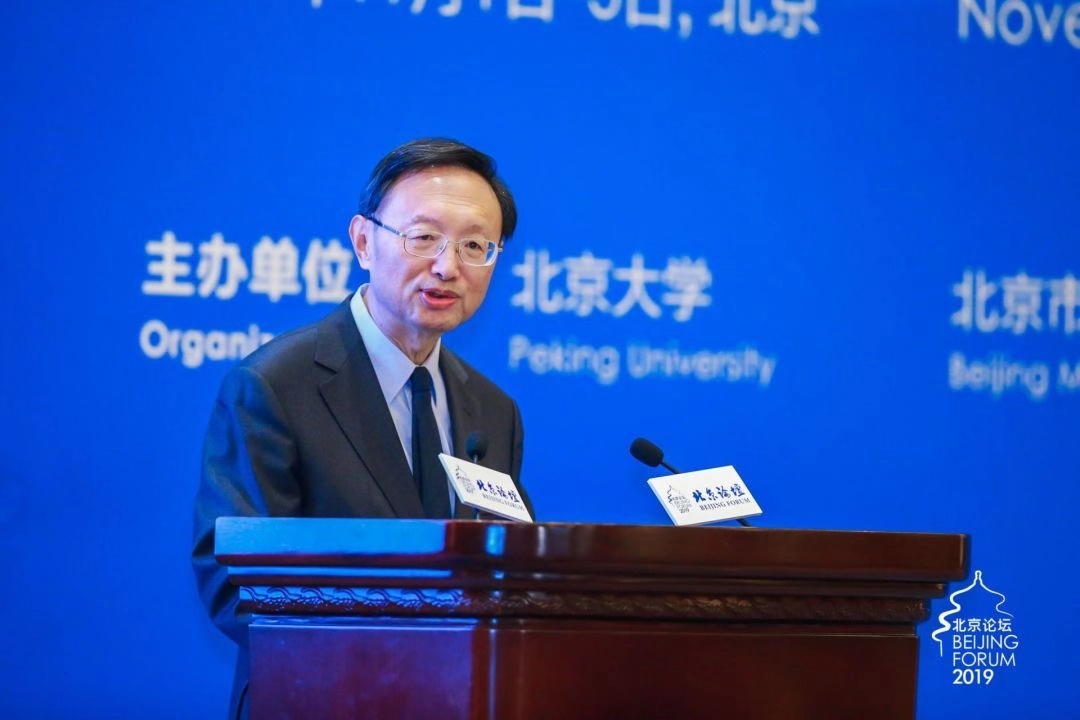Diplomat: 'predictable and constructive' ties needed
By ZHAO HUANXIN in Washington | chinadaily.com.cn | Updated: 2021-02-02 13:49

Broad areas of cooperation exist between the world's top two economies, but there is also a red line concerning China's sovereignty and territorial integrity that must not be crossed, a top Chinese diplomat said on Monday, less than two weeks after the Biden administration took office.
"People in the two countries and beyond are watching closely as to where this relationship is heading," said Yang Jiechi, a member of the Political Bureau of the Communist Party of China Central Committee and director of the Office of the Foreign Affairs Commission of the CPC Central Committee.
It is a task for both countries to restore the relationship to a "predictable and constructive" track of development, and to build a model of interaction focusing on peaceful coexistence and win-win cooperation, Yang said in an online dialogue with the National Committee on United States-China Relations (NCUSCR).
"We hope the new administration will respond to the will of both peoples and follow the trend of history," Yang said in a speech that was livestreamed on the NCUSCR website and youtube.com.
"By focusing on cooperation and managing differences together, the two sides will be able to return the relationship to the course of sound and steady development," he said.
On his first day as US secretary of state on Wednesday, Antony Blinken said it's not a secret that the relationship between the US and China is "arguably the most important relationship that we have in the world going forward", which has both competitive and cooperative aspects.
"There are adversarial aspects to the relationship, there's certainly competitive ones, and there's still some cooperative ones, too," Blinken told NBC News on Monday.
Yang, a former Chinese ambassador to the US, said China should be seen as it is.
He said the root cause of some "misguided" policies toward China, pursued by the previous US administration, is a strategic misjudgment by some US hawks who view China as a major strategic competitor, even an adversary.
"That, I am afraid, is historically, fundamentally and strategically wrong," Yang said.
Yang noted that China's development is essentially about bettering the lives of its people and China is committed to the path of peaceful development, a win-win strategy of opening-up, and a development that is shared by all countries, the United States included.
"We in China hope that the United States will rise above the outdated mentality of zero-sum, major-power rivalry and work with China to keep the relationship on the right track," he said.
For normal interactions to be restored, the two sides have to work in the same direction, with embassies and other channels serving as bridges, and other players like think tanks, universities, media organizations and businesses as well as exchanges at the subnational level contributing in their own ways.
"I hope that the new administration will remove the stumbling blocks to people-to-people exchanges, like harassing Chinese students, restricting Chinese media outlets, shutting down Confucius Institutes and suppressing Chinese companies," Yang said, adding that the measures are "wrong" and "unpopular".
The official said China never meddles in US' internal affairs, including its elections; never exports its development model or seeks ideological confrontation; and has no intention to challenge or replace the US position in the world, or to carve out a sphere of influence.
Likewise, China expects the US to honor its commitment under the three Sino-US Joint Communiqués; strictly abide by the One China principle; and respect China's position and concerns on the Taiwan question, Yang noted.
In addition, the US should stop interfering in the affairs of Hong Kong, Tibet and Xinjiang. Those issues concern China's core interests, national dignity, as well as the sentiments of its 1.4 billion people. They constitute a red line that must not be crossed, Yang said.
"Any trespassing would end up undermining China-US relations and the United States' own interests," he said. "We in China hope that the US side will fully understand the sensitivity of these issues and handle them with prudence, so as to avoid disruption or damage to mutual trust and cooperation."
Yang noted that in the face of COVID-19, there are more and broader areas where the two countries can and must cooperate.
"COVID response, economic recovery and climate change, among others, could become promising areas of cooperation for China and the United States," he said, adding that the two could also discuss ways to jointly improve the global public health system.
"There should be closer exchanges and cooperation between our militaries and in law enforcement, drug control and cybersecurity, and more communication and coordination on regional hot spot issues and on major global challenges," Yang said.
Yang said that trade issues should not be politicized, and the concept of "national security" should not be abused.
"China will always welcome US business investment in China, and it falls on both sides to provide a fair, open and non-discriminatory environment for each other's companies," he said.
Yang also said the history of China-US relations gives reasons to be optimistic about a brighter future for the relationship.
"We need to bear in mind the fundamental interests of people in our two countries and beyond," he said.
Jacob Lew, NCUSCR's new board chair, said that at a time of increased tension in relations between the two countries, new leadership in the US offers a moment to take stock of how to best move forward.
"For the relationship between our great nations to reach a level of engagement and understanding that would benefit each of us and the global community, it's essential that communication leads to tangible steps," said Lew, treasury secretary from 2013 to 2017.
"From my own years of experience, I also know that if leaders approach even very challenging issues and build personal relationships that permit candid exchanges, progress can be made, and conflicts can be managed if agreements are followed by actions," he said.
























